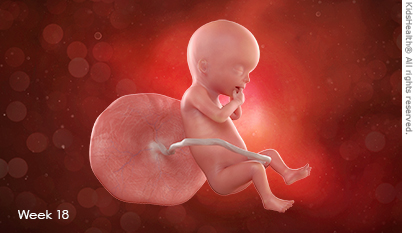- Home
- Humana Medicaid
- Kentucky Medicaid
- Medicaid extras
- Health and wellness
- Parents Home
- Para Padres
- A to Z Dictionary
- Allergy Center
- Asthma
- Cancer
- Diabetes
- Diseases & Conditions
- Doctors & Hospitals
- Emotions & Behavior
- First Aid & Safety
- Flu (Influenza)
- Food Allergies
- General Health
- Growth & Development
- Heart Health & Conditions
- Homework Help Center
- Infections
- Newborn Care
- Nutrition & Fitness
- Play & Learn
- Pregnancy Center
- Preventing Premature Birth
- Q&A
- School & Family Life
- Sports Medicine
- Teens Home
- Para Adolescentes
- Asthma
- Be Your Best Self
- Body & Skin Care
- Cancer
- Diabetes
- Diseases & Conditions
- Drugs & Alcohol
- Flu (Influenza)
- Homework Help
- Infections
- Managing Your Weight
- Medical Care 101
- Mental Health
- Nutrition & Fitness
- Q&A
- Safety & First Aid
- School, Jobs, & Friends
- Sexual Health
- Sports Medicine
- Stress & Coping
Pregnancy Calendar: Week 18
Your Baby's Development
Ears move to their final position and they stand out from the head. And start brushing up on your lullabies — in the coming weeks, your baby will probably be able to hear! The bones of the middle ear and the nerve endings from the brain are developing so that your baby will hear sounds such as your heartbeat and blood moving through the umbilical cord. He or she may even be startled by loud noises!
 Your baby's eyes are also developing — they're now facing forward rather than to the sides, and the retinas may be able to detect the beam of a flashlight if you hold it to your abdomen.
Your baby's eyes are also developing — they're now facing forward rather than to the sides, and the retinas may be able to detect the beam of a flashlight if you hold it to your abdomen.
Until now, your baby's bones had been developing but were still soft. This week, they begin to harden, or ossify. Some of the first bones to ossify are those in the clavicles and the legs.

Your Body
 You're probably beginning to prepare for life with baby. This is a good week to begin your search for a pediatrician or other health care provider for your child. Schedule visits to meet with potential doctors to discuss issues such as appointment availability and when to call in an emergency.
You're probably beginning to prepare for life with baby. This is a good week to begin your search for a pediatrician or other health care provider for your child. Schedule visits to meet with potential doctors to discuss issues such as appointment availability and when to call in an emergency.
You'll also want to learn as much as you can about their practices and procedures. Some good questions to ask: How many health care providers are in the practice? Who covers nights and weekends? What is their policy on phone calls? Which hospitals are they affiliated with? What insurance do they accept? What specialists do they work with? How are emergencies handled?
It's important that you feel comfortable with your child's doctor, so do your homework and make your decision carefully.

© 1995- The Nemours Foundation. KidsHealth® is a registered trademark of The Nemours Foundation. All rights reserved.
Images sourced by The Nemours Foundation and Getty Images.